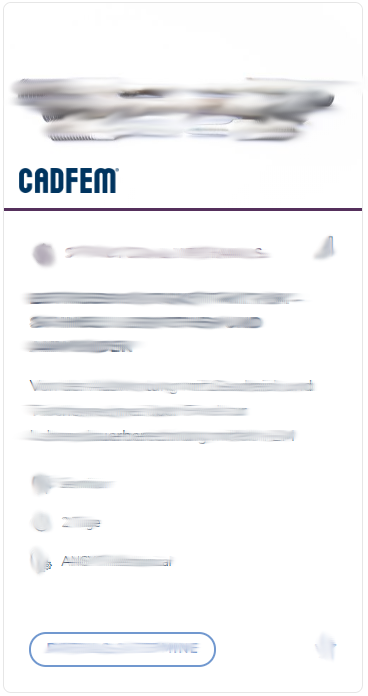
User-defined Hyperelasticity Models with Ansys UPF UserHyper
Based on the eLearning course “Introduction to Ansys UPFs”

Learn how to implement your own hyperelasticity models in Ansys This training is offered as a 1-day course.
Duration
1 day
Prerequisites
Basic knowledge of Ansys Mechanical, Programming knowledge in Fortran
Software used
Ansys Mechanical
- Use hyperelasticity models from literature and research in Ansys Mechanical.
- Use Ansys Mechanical User Programmable Features (UPFs)
- Understand theory, algorithms and numerics of isotropic hyperelasticity
- Program and compile own hyperelasticity models
Description
Non-linear, isotropic, elasticity models for advanced applications of elastomer mechanics can be easily implemented in the implicit Ansys MAPDL solver through a specialized user-programmable feature (UPF), called UserHyper. The aim of this training course is, to illustrate via interactive group work, the practical steps in implementing a state-of-the-art, physics-based, hyperelasticity model in UserHyper.
In the training course you will learn concepts and algorithms to systematically describe and calculate deformation processes in isotropic nonlinear elastic solids of Green's type. Building on your personal level of knowledge, you will learn the programming aspects of hyperelasticity, how to re-link and configure UserHyper() for use in the practice and how to design Workbench Engineering Data GUI for input of UserHyper() material parameters. Furthermore, you will learn how to perform basic runtime debugging and testing of UserHyper() from MS Visual Studio.
This training course is aimed at computational engineers and developers as well as researchers and academic staff at universities who, as part of their tasks, want to extend the list of nonlinear isotropic elasticity models available in Ansys MAPDL.
Detailed agenda for this 1-day training
Day 1
01 User Programmable Features (UPFs): possibilities and prerequisites
- Capabilities of UPFs
- Compiler requirements
- License requirements
- Documentation review
02 Theoretical Minimum for UserHyper()
- Continuum and Computational Hyperelasticity in a nutshell
- The non-affine network model for elastomers: physical basis and algorithmic formulation
03 Software Minimum for UserHyper() (Workshop)
- Explaining UserHyper(): purpose, input/output
- Basic UserHyper()-app: Fortran coding, relinking and configuration of the “cross-link” part of the non-affine model.
- Design of Engineering Data GUI for the basic UserHyper()-app
- Verification in Workbench Mechanical
04 Beyond the Basics of UserHyper() (Workshop)
- Material’s science of tube-constrained polymer stretching,
- Extending the basic UserHyper()-app to include the effect from tube-constrained polymer stretching
- Implementation, re-linking, configuration and experimental validation of extended UserHyper()-app
Your Trainers

Dr.-Ing. Slav Valterov Dimitrov
Placement in the CADFEM Learning Pathway
Participant data
Additional information
Commentary
Whether eLearning, classroom courses, live online training or customized workshops - together we identify the best option for you.
Do you have questions on the training?
If you book through your university, you will receive a 50% discount on the stated fee on training courses and eLearning courses.
For more information on the validity and how booking with the code ACADEMIC50 works, please visit our page on training for academic users.
Straight after you sign up, an automatic confirmation of receipt will be sent to the email addresses you provided. Once you have successfully verified the data you provided, you will receive your personalized sign-up confirmation, containing further information on course fees, the billing address, etc., by email within two to three working days.
As soon as the minimum number of attendees has been reached, you will receive a final training confirmation containing further information. If you have booked an on-site training, we recommend that you wait until you have received this final confirmation before booking your travel and accommodation.
If the minimum number of attendees is not reached, we reserve the right to cancel the training seven days before it is due to start at the latest. We are happy to inform you on changing your booking to an alternative date. Please note that we accept no liability for hotel or travel bookings that attendees have already made.
Usually the training courses start at 9:00 am and end at 5:00 pm of the respective local time. The actual course times will be stated in the booking confirmation. Please note that, depending on the training host, there may be a possible time shift between your and the provider's local time. Therefore all local times are provided with the valid time shift to Greenwich Mean Time (GMT).




